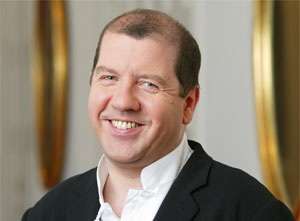|
Back
Romanticized Mozart, Classical Mozarteum Cambridge
Corn Exchange Auditorium
11/18/2010 -
Robert Schumann: Symphony No. 2 in C Major, Op. 61
Wolfgang Amadeus Mozart: Piano Concerto No. 23 in A Major, K. 488
Ludwig van Beethoven: Symphony No. 6 in F major, Op. 68 “Pastoral”
Freddy Kempf (piano)
Salzburg Mozarteum Orchestra, Ivor Bolton (conductor)

I. Bolton (courtesy of Corn Exchange)
It is not surprising that the Mozarteum Orchestra launched their concert with a symphony by Schumann, whose bicentennial anniversary is somehow overshadowed by that of Chopin. Indeed, Schumann’s orchestral work is no easier to perform than those by Mozart and Beethoven. Many critics regard his orchestration as ‘problematic’ and some renowned conductors even claim that in order to capture Schumann’s true spirit on a high plane, change to the score is inevitable. When Schumann’s Second Symphony was performed at the Corn Exchange, Cambridge, on Thursday evening, it was the desiccated acoustics that brought the ‘problematic’ orchestration to the surface – the strings was frequently outshined by the brass. Perhaps it was the size of the concert hall that made Maestro Bolton adopted a relatively small-scale orchestra, with only eight first violins and four cellos. The lucid texture, clear inner voice and baseline, and crisp articulation created an exceptional ‘classical’ taste to this Symphony. But the price they paid was the understated climatic moments, which was particularly evident in the last heroic movement.
The Mozart Piano Concerto that ensued was an absolute delight, brimming with enchantment and elegance. The Mozarteum Orchestra was truly tailor-made for Mozart’s music. Judging by their meticulous articulation and limpid balance, it is indeed very difficult to find a rivalry to compete in excellence. The thoughtful bowings of the strings, in particular, trenchantly captured the exquisiteness of phrasing in the outer movements; the minimal vibrato of the strings and benign tone color of the woodwinds gently cosseted the melancholic second movement without turning it into a poignant Romantic lament. Mr. Kempf rendered the piece with a fastidious and light-hearted approach, with every note beautifully polished throughout. For ears attuned to a more "historically informed" style of Mozart, Mr. Kempf’s expressive and superfine account may sound slightly too romanticized. It reminded me of his rendition of the Schumann concerto in Hong Kong two years ago, in which Beethoven’s Pastoral was also on the program.
Under Maestro Bolton’s baton, this five-movement symphony was truly an imagination of a countryside and rural pastureland that Beethoven wishes to depict. The melodious birdsongs and peaceful breeze were delineated cogently by the bucolic woodwinds and suave strings respectively. After all, it was the three double bassists, who tellingly enriched the colorful harmony that sounded most appealing. It would be a consummate performance if it were not one of the music stands on stage fell twice on the floor. Notwithstanding, it was the fortune of Cambridge audience to have such a supreme orchestra performed in the city.
Danny Kim-Nam Hui
|